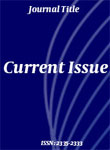Relationship between the Birth Weight of Neonates and Nutritional Intake, Anthropometric Indicators, and Hemoglobin Level of Pregnant Women in the Third Trimester of Pregnancy in Zahedan City, Iran
Author(s):
Abstract:
Introduction
Sufficient nutritional intake before and during pregnancy has significant impacts on the promotion of maternal and neonatal health. Some factors such as anthropometric indicators and biochemical measurements reflect a pregnant woman’s nutritional status and energy store. The aim of the current study was to determine the nutritional intake، anthropometric measurements، and hemoglobin level of expecting women in the third trimester of pregnancy and to assess their correlations with the birth weight of neonates. Methods
The current study was performed in Ali-Ibn-Abi Talib and Tamin-Ejtemaei hospitals in Zahedan after gaining the approval of hospital authorities. Finally، 500 pregnant women were selected for this study. Anthropometric (e. g.، height، weight، fundal height، and abdominal circumference) and biochemical measurements (hemoglobin level) were performed by standard procedures. Family history and nutritional intake of the subjects were recorded، using a questionnaire and 24-hr recall method. Data were analyzed by SPSS software. Results
As the findings indicated، the mean daily energy and protein intakes of the subjects were 1802±437. 0 kcal and 70. 7±18. 9، respectively. In addition، calcium، iron، zinc، and magnesium intakes were 544±289. 0 mg، 16. 1±4. 3 mg، 10. 6±3. 5 mg، and 266±79. 0 mg، respectively. The mean height، weight، body mass index (BMI)، fundal height، abdominal circumference، and hemoglobin level were 156. 4±5. 5 cm، 62. 6±6. 8 kg، 25. 6±3. 6 kg/m2، 43. 2 cm، 104. 1±3. 6 cm، and 11. 1±1. 1 g/dL، respectively. The percentage of nutrient intake adequacy، with reference to Recommended Dietary Allowance (RDA)، showed that protein and magnesium intakes were sufficient (more than 75% of RDA)، while daily energy، calcium، zinc، and iron intakes were inadequate in the subjects. The mean weight of neonates was 3 kg، and the weight of 13% of the infants was < 2. 5 kg. The mean birth weight of neonates significantly elevated with increasing age، educational level، and family income. The increase in anthropometric indicators، hemoglobin level، energy، and nutritional intake of pregnant women resulted in an increment in the mean birth weight of neonates. Conclusion
Our finding showed that energy، protein، and calcium intakes in the third trimester of pregnancy were significantly correlated with the birth weight of neonates (P<0. 05). In addition، data analysis showed that maternal height، weight، fundal height، abdominal circumference، and hemoglobin level were significantly correlated with the birth weight of neonates (P<0. 05).Keywords:
Language:
Persian
Published:
Journal of zabol university of medical sciences and health services, Volume:6 Issue: 3, 2014
Pages:
9 to 21
magiran.com/p1340229
دانلود و مطالعه متن این مقاله با یکی از روشهای زیر امکان پذیر است:
اشتراک شخصی
با عضویت و پرداخت آنلاین حق اشتراک یکساله به مبلغ 1,390,000ريال میتوانید 70 عنوان مطلب دانلود کنید!
اشتراک سازمانی
به کتابخانه دانشگاه یا محل کار خود پیشنهاد کنید تا اشتراک سازمانی این پایگاه را برای دسترسی نامحدود همه کاربران به متن مطالب تهیه نمایند!
توجه!
- حق عضویت دریافتی صرف حمایت از نشریات عضو و نگهداری، تکمیل و توسعه مگیران میشود.
- پرداخت حق اشتراک و دانلود مقالات اجازه بازنشر آن در سایر رسانههای چاپی و دیجیتال را به کاربر نمیدهد.
In order to view content subscription is required
Personal subscription
Subscribe magiran.com for 70 € euros via PayPal and download 70 articles during a year.
Organization subscription
Please contact us to subscribe your university or library for unlimited access!


